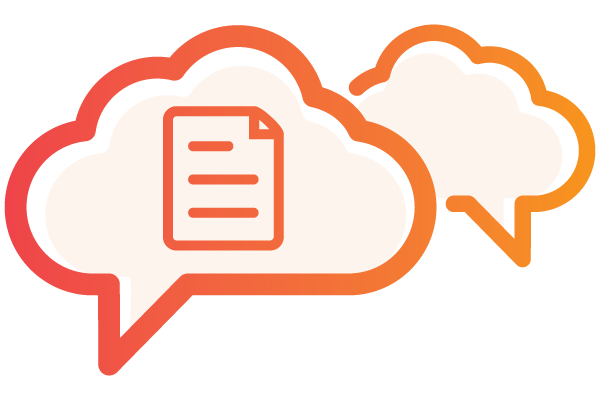Cloud computing is on the rise and, whether we realize it or not, we trust it with an incredible amount of information every day.
You enjoy binge-watching your new favorite show in the cloud. You entrust your family photos to the cloud every time you back up your phone gallery (and you might later edit those photos via the cloud). Much of modern business is conducted in the cloud, at every scale.
Though the legal industry tends to take a cautious approach to tech trends, law firms and corporate legal departments aren’t blind to the benefits of moving their e-discovery efforts to the cloud. After all, such a data-intensive process begs the question: which form of storage is most cost-effective?
But what other questions do they ask first? What do enterprise customers want to know as they consider whether a move to the cloud is right for their business? We asked some members of the Relativity community to share their insights on just that.
On Anticipating the Questions that Come Up First
What’s the first question a typical prospect or customer asks you about moving to the cloud?
 Adi Elliott, VP, Market Planning, Epiq:
Adi Elliott, VP, Market Planning, Epiq:
“What is ‘the cloud?’ Has that question changed over time? Not really—there is still a lot of ambiguity around the cloud and what people mean when they talk about it. The end result for many users of e-discovery software hasn’t changed in the past decade: They log in and code documents. Where the servers reside is an implementation detail.”
 Wendy King, Managing Director, FTI Consulting:
Wendy King, Managing Director, FTI Consulting:
“Lawyers are often focused on reducing risk, so it makes sense that as a group, lawyers have been reticent about moving e-discovery to the cloud. After all, e-discovery data is often the most sensitive or valuable information within an organization, so they want to make sure that it remains secure. Things are definitely changing, though. Now that most organizations are standardizing on cloud suites like Office 365, we still hear questions about security, access control, and service quality and availability, but there is less worry driving them. Generally, as clients complete successful migrations to Office 365 or AWS, they become much more comfortable with the concept of leveraging cloud-based software for other functions, such as e-discovery.”
On Overcoming Common Hurdles
What makes customers hesitate on moving to the cloud, and how do you help calm those concerns?
 Wendy King, Managing Director, FTI Consulting:
Wendy King, Managing Director, FTI Consulting:
“Data privacy regulations are top-of-mind for many organizations in today’s landscape, and the discussions around cloud usage have evolved to focus on whether cloud solutions are in compliance with laws that limit how data is transferred across borders. Our large, multi-national clients must be particularly cautious, and we help them navigate how their cloud software deployments may impact their requirements relating to various data protection laws. Clients are also thinking about how to adapt to the dynamic and ever-changing nature of cloud databases. It is important for them to evaluate how cloud software will impact their e-discovery projects, and build workflows that address any challenges that arise. Legal teams understand the inherent advantages and cost savings provided by cloud-based software. Once they determine that their unique e-discovery needs can be fulfilled through a cloud deployment, and have addressed the key issues of privacy, security, and accessibility, they are usually eager to adopt the model.”
 Josh Hass, eDiscovery and Structured Data Solution Leader, CRA:
Josh Hass, eDiscovery and Structured Data Solution Leader, CRA:
“Cloud-based hosting for many still seems like a black box, and it is the unknown that makes customers hesitate. Many prefer the traditional data center model, finding comfort in the ability to look at a server in a cage at a secure co-location with the understanding that is where their data resides. For those interested in moving to the cloud, they are excited by the elevated security, reduction in cost, and ability to rapidly scale resources.”
On Proving the Cloud is Viable—For Your Client’s Business and Yours
Why do you believe the cloud is a viable solution for your business as well as your clients?
 Adi Elliott, VP, Market Planning, Epiq:
Adi Elliott, VP, Market Planning, Epiq:
“It’s the same reason e-discovery has been a ‘cloud’ business to law firms and corporations this whole time: Clients don’t want to be on the hook for managing the scale and infrastructure for something that isn’t their core business. Which is why Epiq is a client of Salesforce.com and Workday, for example.”
 Josh Hass, eDiscovery and Structured Data Solution Leader, CRA:
Josh Hass, eDiscovery and Structured Data Solution Leader, CRA:
“Data volumes have become larger, deadlines are getting shorter, and cost reduction is a top priority for our business and customers. Utilizing a cloud-based solution removes many of the hurdles associated with the traditional hosting model. Implementing a cloud solution results in superior computing power, and enhanced capabilities supported by a scalable system that utilizes virtual resources to deliver sustainable economic benefits to our firm and our clients.”











